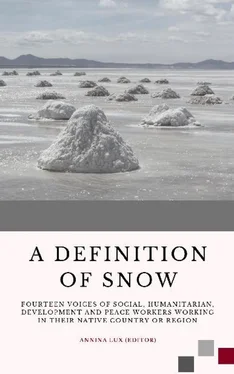I helped with preparing food for the children, feeding them, cleaning the rooms they stayed in, washing their clothes and, at times, simple things like getting them out of the house to go and bask in the sun and playing with them. Starting out as a volunteer, like most people I thought I was going to help the children, however I feel like they helped me more than I helped them. I learnt immense lessons from them. Their simple acts of kindness and the resilience by which they fight the many challenges they face has taught me to appreciate life as it is and to be grateful for whatever is going on in my life. I learnt how to be happy and content with everything I have or do not have. Despite the great challenges that the children faced, there was no day that I would not get a smile or a laugh from them. I often found myself asking, ‘If these children can afford to be so happy with all the challenges they are facing, what reason do I have to be unhappy?’ So I resolved, instead of looking at what was not working in my life, that I would choose to count all my blessings and see how I can spread the joy to those around me.
I learnt unconditional love from both the children and those who take care of them. The moment anyone walks into this home they are received with warm embraces from the children, with pure excitement and joy. The children care for each other as brothers and sisters. It was always a delight to see how one child would soothe another when he or she was crying. Whenever a child fell sick, sadness was felt by everyone; in fact, I too found myself calling the home to check on the child’s progress. I also understood the fact that it does not take much to be of help to someone, and that simple acts of love can go a long way in changing lives. There is a world that exists out there that needs my help no matter how little it is. Every single time I left Total Rehab, one of the staff members would express her gratitude because she felt like what we did as a team was very helpful to them. I still try to remember this even now when I am miles away from my country.
In addition, I was challenged by the immense sacrifice that Teresia and her team have made to ensure that they take proper care of the children. At the time I was volunteering, Teresia had not been home for the last two years simply because she could not take a day off, as she has a limited number of staff. Her colleagues work for little or no pay, yet they diligently show up every day to provide care and support to the children. I learnt humility and patience. There are times that it would take me up to an hour to feed a child because he or she experienced difficulty in feeding. All this time spent with the children created a bond with them. It was therefore very sad when I learnt about the demise of two children shortly after I left the institution. The cause of death for one of the children was a combination of leukaemia and asthma, while the other was a brain condition that the doctors were eventually unable to treat.
However, apart from the positive lessons, I also felt and still do feel angry at society for not caring enough to do more for children with disabilities. My anger partly stems from the knowledge that some of the children at Total Rehab were abandoned and neglected by their parents. Furthermore, some children were born as a result of rape committed against women with mental disability. Women with mental disabilities face more risks in societies where mental illness is not a subject of discussion or where people with such challenges are not well taken care of. This makes them vulnerable not only to sexual harassment, but also to emotional abuse as they do not have someone to defend or protect them. Eventually, some fall prey to men who have no value or respect for them and see them as an opportunity to quench their lust. This matter is seldom openly discussed, so there are limited channels for addressing it.
As I write now, the Centre battles limitations. Al-though it is meant to be a rehabilitation centre for children with disabilities, it acts more like a boarding facility. This is because it mainly provides accommodation, feeding programmes and some medical assistance. The Centre does not have sufficient equipment to provide proper therapy and the equipment that is present is only used during the very limited therapy sessions that the children receive. It pains me to know that most of the children there could get better with adequate and consistent therapy but this is not given to them – not by choice but due to insufficient resources. There are two volunteer physiotherapists affiliated with the institution, however they come at separate times meaning they have all the children to handle in a limited time. The result is that the children end up receiving therapy once a week, which is inadequate. In addition, most of the parents have abandoned all responsibility for their children, leaving them to Teresia, and this includes medical care in the event that a child falls sick or is injured. With limited funds, Ms. Teresia is unable to afford quality medical care for the children.
I grew fond of all the children in the Centre but I became closely attached to one of them, Mark 4. Mark, like most of the children in the Centre, has cerebral palsy. He was abandoned by his parents after they discovered he was disabled. I was told that when he came to the Centre, he had huge problems with feeding because he was born tongue-tied, a condition known as ankyloglossia in medical terms. This comes about when the tissue that connects the floor of the mouth and the bottom of the tongue is too short and tight, causing the movement of the tongue to be restricted. Mark was, therefore, malnourished and Ms. Teresia was not sure he would survive. She took him to hospital and the condition was rectified. Currently he feeds very well and is a very healthy boy. However, Mark cannot walk, neither can he talk, and the saddest part was knowing that he would have been able to do both of these things had he received consistent physiotherapy and special shoes to help him learn how to walk, as well as speech therapy. Affording this kind of help for Mark has been impossible due to the lack of resources that the Centre has. The home in which the children are hosted was provided by a well-wisher who rents it to them at a reduced price. The house is not wheelchair friendly, yet there are several children who are in a wheelchair. The children receive very minimal conventional education and vocational training to facilitate their future reintegration into society, despite the fact that this is one of the services that the institution wishes to offer. This means that the Centre currently provides temporary and immediate solutions such as food and shelter but falls short in addressing long-term issues such as equipping the children with some useful skills. My hope for the Centre is that it will be able to provide these kinds of services in the future. For it to do so, it needs both financial support and human resources.
I have seen the Centre function through the support of well-wishers from the Kenyan community. The majority of the people who make generous donations to the Centre are Kenyans who do not necessarily come from the wealthy class, but are good-hearted, well-meaning individuals who through collective effort are able to mobilise resources and help out. Total Rehab Centre is not the only example of initiatives started by Kenyans and funded by fellow Kenyans. This gives me much hope, because I truly believe that for countries such as mine to tackle the issues facing them, there is need for local capacity-building. Here I mean that we need more initiatives started and supported by the local population, thus challenging the mentality that help can only come from outside i.e. Western donors. When we as Africans take the leading role in helping each other, we will be challenged all the more to work harder. Locally-supported projects increase accountability, as the people will always be keen to know that their funds are being channelled in the right way and not misused. It is my hope that more and more people will be at the front line in spearheading and supporting such initiatives.
Читать дальше




![Serg Aill&Lex Lux - Идефикс. Жажда силы [СИ]](/books/422633/serg-aill-lex-lux-idefiks-zhazhda-sily-si-thumb.webp)







